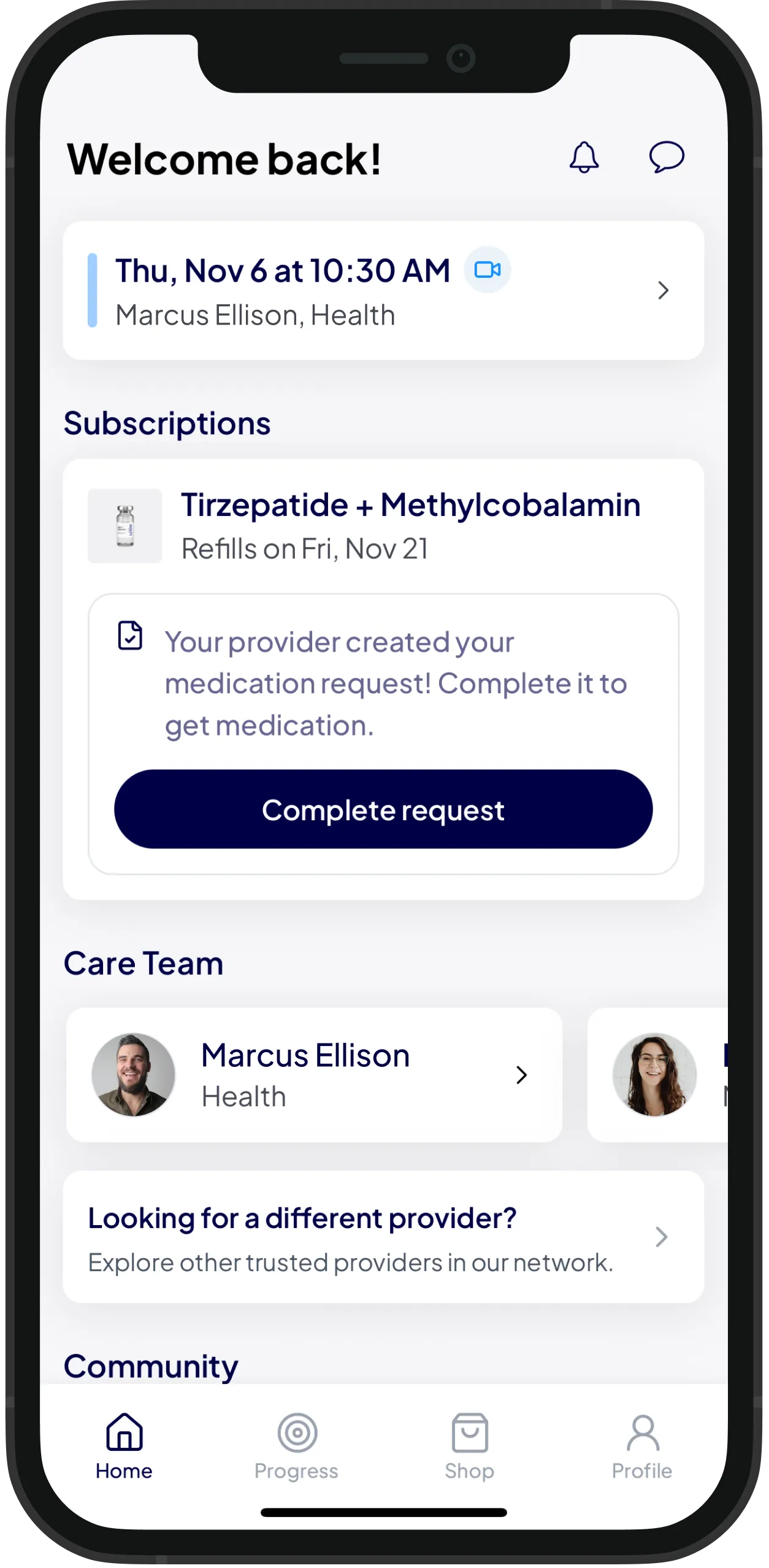Ready to transform your health?
Unlock access to expert guidance and a weight care plan crafted just for you.
Similar Articles
Similar Articles

GLP-1s for Pre-diabetes: Can You Prevent Type II Diabetes?
GLP-1s for Pre-diabetes: Can You Prevent Type II Diabetes?

Is Long-Term GLP-1 Use Safe? What 10-Year Data Suggests
Is Long-Term GLP-1 Use Safe? What 10-Year Data Suggests

GLP 1s and Cardiometabolic Health: How These Medications Support the Heart and Long Term Wellness
GLP 1s and Cardiometabolic Health: How These Medications Support the Heart and Long Term Wellness
Can Phentermine Affect Your Period?
Phentermine is an anti-obesity medication which can help an individual shed weight on a healthy basis. Some notice menstrual cycle changes as well.

Table of Contents
Table of Contents
Introduction to Phentermine
Can phentermine affect your period?
Phentermine may affect ovulation, which can impact fertility
For some women, phentermine can increase breast size and tenderness
Phentermine is a stimulant
Conclusion
Introduction to Phentermine
Can phentermine affect your period?
Phentermine may affect ovulation, which can impact fertility
For some women, phentermine can increase breast size and tenderness
Phentermine is a stimulant
Conclusion
Introduction to Phentermine
Phentermine is a prescription medication that's used to help you lose weight. It works by decreasing the amount of food you eat and increasing your energy level, creating a calorie deficit. In some cases, phentermine can also cause changes to your period or ovulation patterns. If you're experiencing multiple changes to your period while taking this drug, it's important to talk with your doctor about switching medications.
Can phentermine affect your period?
Phentermine is a stimulant that can affect the menstrual cycle and cause irregular periods, weight loss, breast tenderness, headaches and insomnia.
The drug causes dry mouth in some people who take it.
If you have a regular period, your cycle may become shorter or longer.
If you have a regular period, your cycle may become shorter or longer. If it's shorter, that could mean that you ovulate earlier than usual and therefore are more fertile. If it's longer, this could be due to lack of ovulation or anovulation (no egg production).
If you normally have irregular periods, you may notice more consistency, particularly if you have PCOS.
If you have PCOS and are looking for ways to manage your symptoms or improve your fertility, phentermine is a good option. Phentermine works by increasing the amount of the hormone norepinephrine in the brain. Norepinephrine signals hunger, which can then lead to weight loss after taking phentermine. The effective dose for women with PCOS is between 5 and 15 mg per day; however, if you have been diagnosed with high blood pressure or heart disease and are taking phentermine, consult your doctor before beginning treatment.
Phentermine may affect ovulation, which can impact fertility
Phentermine is a stimulant and may affect your menstrual cycle. This can happen in a few different ways, including:
Your periods are light or heavy on the days they're supposed to be.
You have longer or shorter cycles than normal.
Your periods last longer than usual or don't start at all when they should.
If any of these things are happening to you, it could mean that your ovulation isn't regular anymore because of phentermine use. If this happens often enough, it might make it harder for you to get pregnant.
For some women, phentermine can increase breast size and tenderness
Phentermine is known to cause breast tenderness in some women. It's also been reported that the drug can cause breast size to increase.
Phentermine is a stimulant
Because phentermine is a stimulant, it can cause a variety of side effects including:
Increased heart rate and blood pressure
Insomnia
Anxiety or agitation
Headaches and dizziness
If you're experiencing multiple changes to your period while taking phentermine, talk to your doctor about switching medications.
If you're experiencing multiple changes to your period while taking phentermine, talk to your doctor about switching medications. It could be that the dose is too high or that you need a medication with fewer side effects.
If the problem persists, you may need to switch medications. If you're taking phentermine for weight loss, you may need to lower the dose or stop taking it.
Conclusion
As we’ve seen, phentermine is a medication that can cause some changes to your menstrual cycle. It can affect ovulation, which means that you may have difficulty getting pregnant or carrying a pregnancy to term. If you have irregular periods and are experiencing the side effects of this drug, talk to your doctor about switching medications.
Introduction to Phentermine
Phentermine is a prescription medication that's used to help you lose weight. It works by decreasing the amount of food you eat and increasing your energy level, creating a calorie deficit. In some cases, phentermine can also cause changes to your period or ovulation patterns. If you're experiencing multiple changes to your period while taking this drug, it's important to talk with your doctor about switching medications.
Can phentermine affect your period?
Phentermine is a stimulant that can affect the menstrual cycle and cause irregular periods, weight loss, breast tenderness, headaches and insomnia.
The drug causes dry mouth in some people who take it.
If you have a regular period, your cycle may become shorter or longer.
If you have a regular period, your cycle may become shorter or longer. If it's shorter, that could mean that you ovulate earlier than usual and therefore are more fertile. If it's longer, this could be due to lack of ovulation or anovulation (no egg production).
If you normally have irregular periods, you may notice more consistency, particularly if you have PCOS.
If you have PCOS and are looking for ways to manage your symptoms or improve your fertility, phentermine is a good option. Phentermine works by increasing the amount of the hormone norepinephrine in the brain. Norepinephrine signals hunger, which can then lead to weight loss after taking phentermine. The effective dose for women with PCOS is between 5 and 15 mg per day; however, if you have been diagnosed with high blood pressure or heart disease and are taking phentermine, consult your doctor before beginning treatment.
Phentermine may affect ovulation, which can impact fertility
Phentermine is a stimulant and may affect your menstrual cycle. This can happen in a few different ways, including:
Your periods are light or heavy on the days they're supposed to be.
You have longer or shorter cycles than normal.
Your periods last longer than usual or don't start at all when they should.
If any of these things are happening to you, it could mean that your ovulation isn't regular anymore because of phentermine use. If this happens often enough, it might make it harder for you to get pregnant.
For some women, phentermine can increase breast size and tenderness
Phentermine is known to cause breast tenderness in some women. It's also been reported that the drug can cause breast size to increase.
Phentermine is a stimulant
Because phentermine is a stimulant, it can cause a variety of side effects including:
Increased heart rate and blood pressure
Insomnia
Anxiety or agitation
Headaches and dizziness
If you're experiencing multiple changes to your period while taking phentermine, talk to your doctor about switching medications.
If you're experiencing multiple changes to your period while taking phentermine, talk to your doctor about switching medications. It could be that the dose is too high or that you need a medication with fewer side effects.
If the problem persists, you may need to switch medications. If you're taking phentermine for weight loss, you may need to lower the dose or stop taking it.
Conclusion
As we’ve seen, phentermine is a medication that can cause some changes to your menstrual cycle. It can affect ovulation, which means that you may have difficulty getting pregnant or carrying a pregnancy to term. If you have irregular periods and are experiencing the side effects of this drug, talk to your doctor about switching medications.
Read next
Ready to transform your health?
Unlock access to expert guidance and a weight care plan crafted just for you.

Ready to transform your health?
Unlock access to expert guidance and a weight care plan crafted just for you.

Ready to transform your health?
Unlock access to expert guidance and a weight care plan crafted just for you.


© 2026 Mochi Health
All professional medical services are provided by licensed physicians and clinicians affiliated with independently owned and operated professional practices. Mochi Health Corp. provides administrative and technology services to affiliated medical practices it supports, and does not provide any professional medical services itself.


© 2026 Mochi Health
All professional medical services are provided by licensed physicians and clinicians affiliated with independently owned and operated professional practices. Mochi Health Corp. provides administrative and technology services to affiliated medical practices it supports, and does not provide any professional medical services itself.


© 2026 Mochi Health
All professional medical services are provided by licensed physicians and clinicians affiliated with independently owned and operated professional practices. Mochi Health Corp. provides administrative and technology services to affiliated medical practices it supports, and does not provide any professional medical services itself.
















